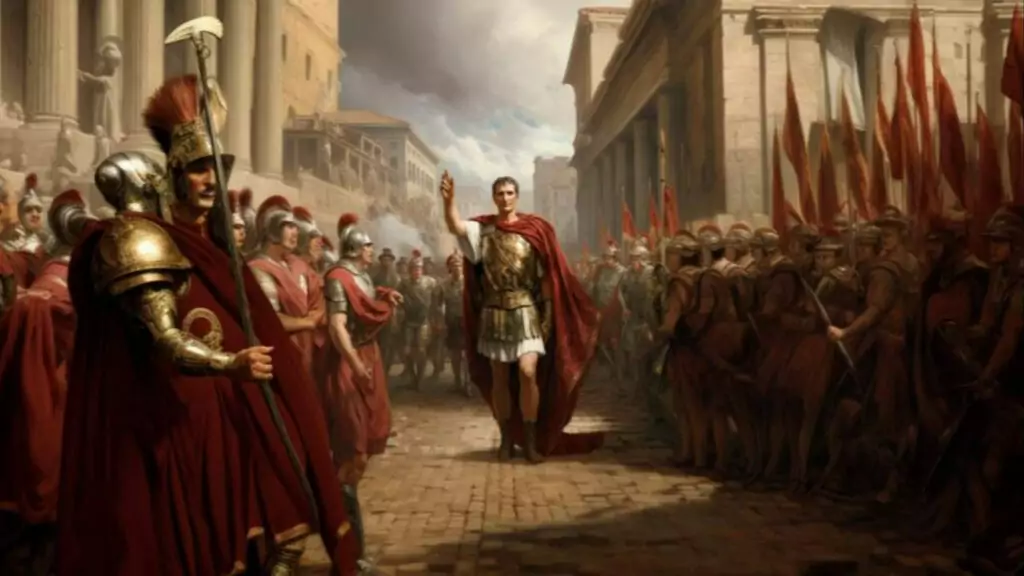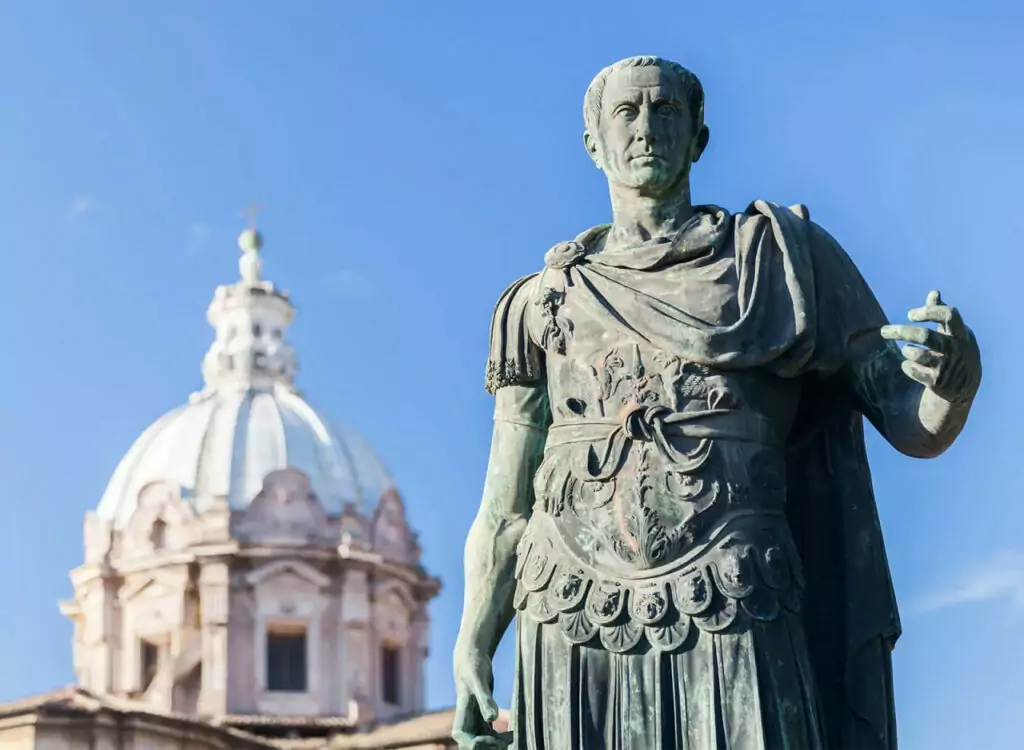The following review example can serve as a guide for students trying to find inspiration when writing an assignment on the question “Was Julius Caesar a good leader?”

✅ AI Essay Writer ✅ AI Detector ✅ Plagchecker ✅ Paraphraser
✅ Summarizer ✅ Citation Generator
There is not a person who would not know the name of the most prominent historic ruler – Julius Caesar. Julius Caesar’s leadership during the 1st century BCE was marked by significant achievements and reforms that have led to debates about his legacy.
A masterful military strategist, Caesar expanded Rome’s territories substantially, enhancing its power and influence. His respect and care for his soldiers were notable; he not only fought alongside them but also rewarded their service with land and titles, fostering loyalty and morale. Beyond military accomplishments, Caesar was pivotal in the economic and social restructuring of the Roman Republic. His reforms, such as redistributing land to the impoverished and providing for veterans, demonstrated a commitment to societal stability and equity. Additionally, his stance against corruption and extortion highlighted his efforts to uphold moral integrity within the governance. These actions were instrumental in the transformation of the Roman Republic, setting the foundation for the subsequent Roman Empire. Caesar’s approach to leadership, combining military prowess with social and economic reforms, suggests that he was more than a power-seeking ruler; he was a visionary who played a crucial role in shaping Rome’s future.
Leadership lessons from Julius Caesar
Julius Caesar, one of the most iconic figures in history, exemplifies a multifaceted leader whose strategies and characteristics continue to be studied and admired. His ability to connect with people, communicate effectively, share information, maximize potential, accept responsibility, celebrate successes, handle difficult tasks, and take risks are lessons in leadership that remain relevant today. So, was Caesar a good ruler? Let’s find out.

Connection with Soldiers
Caesar’s unique approach to leadership was significantly influenced by his ability to connect personally with his troops. Growing up in a politically tumultuous era, he learned early the importance of personal connections. His time in the military not only honed his leadership skills but also deepened his understanding of the common soldier’s experience. He was known to know the names of his soldiers, a testament to his commitment to personal connection. This approach not only earned him loyalty but also enabled him to gauge the morale and readiness of his troops effectively.
Communication Skills
Caesar’s prowess as a communicator was evident both in his writings and his orations. An accomplished author and historian, he documented his military campaigns, offering insights into his strategies and thoughts. His ability to articulate his ideas with clarity and persuasion was crucial in his rise to power. His speeches in the Senate were not just a display of eloquence but a powerful tool in swaying public and political opinion.
Information Sharing
Information sharing was a cornerstone of Caesar’s military strategy. He ensured that every centurion had as much information about the battle plans as he did. This transparency fostered trust and allowed for a more cohesive and responsive military force. In the context of modern leadership, this translates to ensuring that team leaders are well-informed and aligned with the organization’s goals and strategies.
Maximizing Potential
Caesar was adept at maximizing the potential of his resources, be it his soldiers or weaponry. The Roman legions, known for their use of small, sharp daggers, were a testament to his belief in using even the smallest tools effectively. He understood the importance of training and equipping his troops to utilize their resources to their fullest potential.
Accepting Responsibility
A hallmark of Caesar’s leadership was his willingness to accept responsibility. He stayed close to his troops, sharing in their hardships and challenges. This not only allowed him to make swift and informed decisions but also demonstrated his commitment to his role as a leader. He did not shy away from difficult decisions or tasks, setting an example for his men.
Celebrating Successes
Caesar knew the importance of recognizing and celebrating successes. His victories were well-publicized, often becoming the subject of his written works. In leadership, this translates to acknowledging the achievements of the team, fostering a sense of shared success and motivation.

Handling Difficult Tasks
Caesar’s leadership was also marked by his willingness to undertake difficult tasks himself. This included punishing deserters, a tough but necessary part of maintaining discipline. By taking on these challenging tasks personally, he set a high standard for his troops and demonstrated his commitment to justice and order.
Taking Risks
Finally, Caesar’s tolerance for risk was a defining trait of his leadership. He was not afraid to make bold decisions, understanding that risk-taking was a necessary component of achieving great success. His ability to assess and take calculated risks was fundamental in his military campaigns and political maneuvers.
In conclusion, Julius Caesar’s leadership style was a blend of personal connection, effective communication, strategic information sharing, maximizing potential, accepting responsibility, celebrating successes, handling difficult tasks personally, and taking calculated risks. These traits not only made him a formidable leader in his time but also provide enduring lessons for leaders in the modern era. His legacy, marked by both achievements and controversies, continues to be a subject of study and admiration, offering insights into the complex nature of leadership and power.
Final Thoughts
“Was Julius Caesar a successful leader?” As a masterful military strategist, Caesar expanded Rome’s territories and was deeply respected by his soldiers, whom he treated with care and rewarded generously. His leadership went beyond military prowess, as he played a pivotal role in the economic and social restructuring of the Roman Republic through reforms like land redistribution and combating corruption.
The article highlights key aspects of his leadership: his ability to connect with soldiers, his effective communication skills, transparent information sharing, maximization of potential resources, acceptance of responsibility, celebration of successes, handling of difficult tasks personally, and willingness to take calculated risks. These traits made Caesar not just a powerful ruler but also a visionary leader whose approach to leadership offers enduring lessons. His legacy, a blend of controversy and achievement, continues to be a subject of analysis and admiration, providing a deep understanding of the complexities of leadership and power.
Follow us on Reddit for more insights and updates.





Comments (0)
Welcome to A*Help comments!
We’re all about debate and discussion at A*Help.
We value the diverse opinions of users, so you may find points of view that you don’t agree with. And that’s cool. However, there are certain things we’re not OK with: attempts to manipulate our data in any way, for example, or the posting of discriminative, offensive, hateful, or disparaging material.